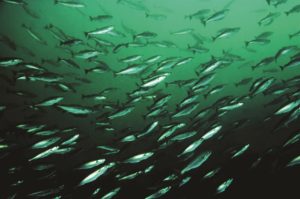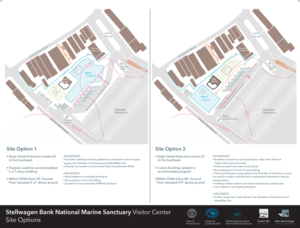PROVINCETOWN — One of the Outer Cape’s greatest assets is its proximity to Stellwagen Bank National Marine Sanctuary, a federally protected swath of ocean whose southernmost boundary is just three miles north of Provincetown. It harbors a thriving marine ecosystem that supports the local fishing and whale-watching industries.
Yet, to many people, it is little more than “a line on the map,” said Anne-Marie Runfola, program coordinator and visitor center project manager at the National Oceanic and Atmospheric Administration (NOAA).
NOAA, the Center for Coastal Studies (CCS), and the town are working to change the way people see Stellwagen Bank with a new waterfront visitor center to be tucked between the bus parking spots and pump station at the Commercial Street end of MacMillan Pier.

First discovered in 1854, Stellwagen Bank is an 842-square-mile expanse of open ocean. This bank, said Runfola, “is not a financial institution.” It is, she explained, an underwater plateau left when the glaciers retreated more than 10,000 years ago.
It is also a rich feeding ground, supporting many marine species. That’s because “it has steep sides, but it’s also shallow on top,” said Runfola. “That allows for photosynthesis in the warmer water on the top, and then wind and waves help bring nutrients from the bottom back up to the surface.”
When Stellwagen Bank was designated a National Marine Sanctuary in 1992, NOAA took control of regulating what activities are allowed within the area. Despite federal protection, however, Stellwagen Bank is far from an economic dead zone.
“The term ‘sanctuary’ is a bit of a misnomer,” said Pete DeCola, the sanctuary’s superintendent.
It is, he said, part of the “blue economy,” producing a significant amount of economic activity for Provincetown and other coastal communities.
The sanctuary designation “doesn’t mean it’s hands-off and no one can go in there,” said Runfola. “We have marine transportation, whale watching, recreational fishing and boating, commercial fishing, science, research, conservation — you name it. It’s happening out there.”
As a premier whale-watching destination, Stellwagen Bank gets consistent tourist traffic. So, one priority for NOAA is to bring the experience of the place to people on land. In partnership with the Woods Hole Oceanographic Institution, NOAA recently took 360-degree images of a number of the sanctuary’s shipwrecks and is putting together “virtual dives” to allow non-divers to experience these sites for themselves.
NOAA is also working on a project to find descendants of those who died in the sinking of the Steamship Portland — known as the “Titanic of New England” — in order to show them images of the wreck and collect family stories.
Those efforts will, Runfola hopes, help people connect to Stellwagen Bank emotionally. Without that, she said, “it’s really hard for them to want to get to learn more, to get involved, and to want to protect the resources.”
The proposed site for the visitor center is near the pier’s whale-watching charters, so it can give people a chance to learn about the marine ecosystem before seeing it for themselves. The plan is for the visitor center to serve as a community space. Architects have included multipurpose performance and exhibition spaces in their initial mockups.
“It’s a great opportunity for Provincetown to have another space that it can utilize for its own programs and activities,” said Provincetown Town Planner Thaddeus Soule. “It’s also an opportunity to refresh our outdated comfort stations.”

In fact, the need to update the public restrooms near MacMillan Pier was one of the factors that got the project off the ground. When updating the restrooms was proposed a few years ago, CCS and NOAA saw an opportunity.
On Oct. 28, representatives from NOAA, CCS, the town, and architectural firm Oudens Ello held a forum on the proposed site. Community members had suggestions, including making room for green space onsite, having multi-use rooms for rotating exhibits, and adding classrooms for schools to use. The project partners will be hosting a webinar after Thanksgiving, though the date for it remains to be set.
“We’re in the fact-gathering mode now, and we’re excited to figure out the feedback,” said Conrad Ello, founding principal at Oudens Ello. Designers will be considering public feedback through the rest of this month. “This project is so much about the public and for the public,” he said, adding, “Provincetown is a community that seems to have a lot of engagement.”



